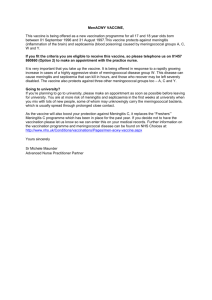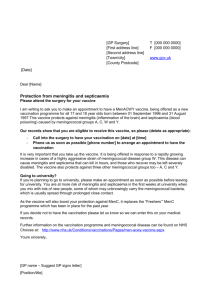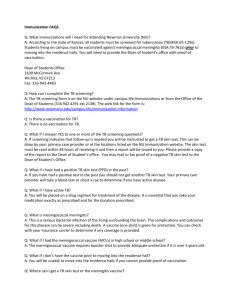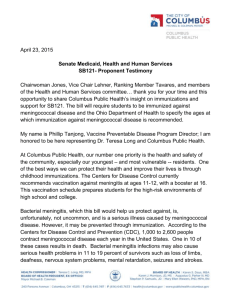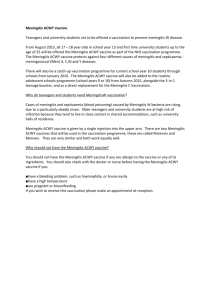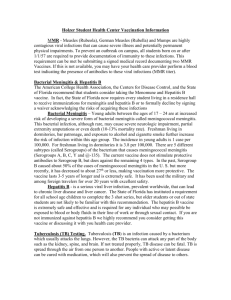GiveWell's summary of the key points discussed in a phone
advertisement
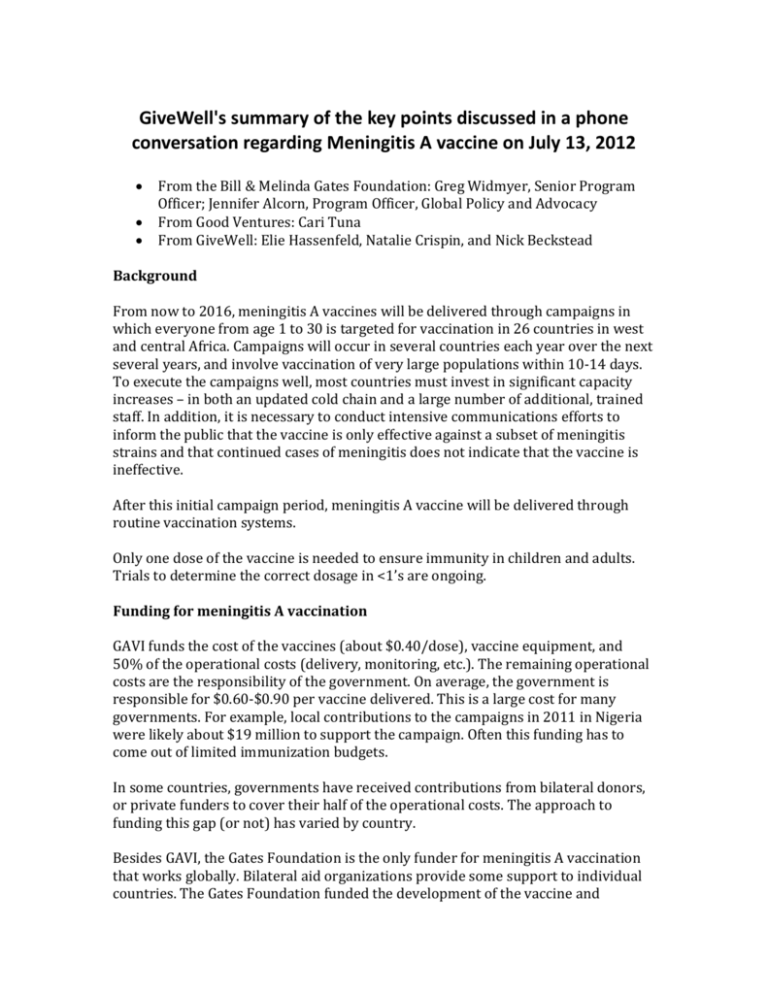
GiveWell's summary of the key points discussed in a phone conversation regarding Meningitis A vaccine on July 13, 2012 From the Bill & Melinda Gates Foundation: Greg Widmyer, Senior Program Officer; Jennifer Alcorn, Program Officer, Global Policy and Advocacy From Good Ventures: Cari Tuna From GiveWell: Elie Hassenfeld, Natalie Crispin, and Nick Beckstead Background From now to 2016, meningitis A vaccines will be delivered through campaigns in which everyone from age 1 to 30 is targeted for vaccination in 26 countries in west and central Africa. Campaigns will occur in several countries each year over the next several years, and involve vaccination of very large populations within 10-14 days. To execute the campaigns well, most countries must invest in significant capacity increases – in both an updated cold chain and a large number of additional, trained staff. In addition, it is necessary to conduct intensive communications efforts to inform the public that the vaccine is only effective against a subset of meningitis strains and that continued cases of meningitis does not indicate that the vaccine is ineffective. After this initial campaign period, meningitis A vaccine will be delivered through routine vaccination systems. Only one dose of the vaccine is needed to ensure immunity in children and adults. Trials to determine the correct dosage in <1’s are ongoing. Funding for meningitis A vaccination GAVI funds the cost of the vaccines (about $0.40/dose), vaccine equipment, and 50% of the operational costs (delivery, monitoring, etc.). The remaining operational costs are the responsibility of the government. On average, the government is responsible for $0.60-$0.90 per vaccine delivered. This is a large cost for many governments. For example, local contributions to the campaigns in 2011 in Nigeria were likely about $19 million to support the campaign. Often this funding has to come out of limited immunization budgets. In some countries, governments have received contributions from bilateral donors, or private funders to cover their half of the operational costs. The approach to funding this gap (or not) has varied by country. Besides GAVI, the Gates Foundation is the only funder for meningitis A vaccination that works globally. Bilateral aid organizations provide some support to individual countries. The Gates Foundation funded the development of the vaccine and supports delivery through its significant support for GAVI. The Foundation does not currently plan to provide additional funding for vaccine development although it is considering investments to ensure that the vaccine has the desired impact. Room for more funding The Gates Foundation told us that there is currently a funding need to support delivery of the meningitis A vaccination in 2012 and likely will be for subsequent campaign years. This funding gap is for unfunded operational costs that are the government's responsibility but which, in some cases, the government cannot support In general, when a campaign is not fully funded, it will be implemented at full scale, but the quality of the campaign will suffer. For example, some vaccinators may not get paid or clinics may have a single staff member working on the campaign, instead of a recommended staff of three, training may be scaled back, communications efforts will be limited, etc. Funding mechanisms GAVI and bilateral aid agencies provide support directly to governments. In addition, other organizations, such as MSF, have worked on meningitis A vaccination and supported their work with their own funds in specific areas. About the Private Donor Engagement Initiative at the Gates Foundation The Private Donor Engagement team works with high net worth individuals to assist them in identifying projects that the Gates Foundation believes are impactful and would benefit from additional funding, allowing individuals to invest alongside the Gates Foundation should they choose to do so. The Gates Foundation has recently created a pilot "field of interest fund." This fund will be hosted by J.P. Morgan, and will allow individuals to support one or more of the following three causes: (1) polio eradication; (2) meningitis A vaccination; or (3) neglected tropical disease (NTD) prevention and treatment. Donations will be eligible for tax benefits in the U.S. Donors will be encouraged to specify which of the three causes they would like their donation to support. Funds for polio will flow through the World Health Organization, while funds for meningitis A vaccination will flow through both WHO and UNICEF. Funds for NTDs will go to the END Fund, a private philanthropic initiative which is conducting integrated disease campaigns in sub-Saharan Africa. WHO, UNICEF, and the END Fund will report annually on the use of funds and progress made. The Gates Foundation chose these three causes for this pilot project because they are inexpensive on a per-person-reached basis, each has a demonstrable need for more funding, each quickly results in measurable impact, and the work can be observed during site visits. Additional initiatives may be considered in the future. Evaluation of meningitis A vaccination campaigns Early results have been encouraging. To date, there have been no reported cases of meningitis A in vaccinated individuals. However, meningitis is a very temporal disease, and incidence can vary considerably from year to year, so it is difficult to infer impact from only a couple years of data. Mr. Widmyer believes that additional funding is needed to improve impact monitoring, i.e. disease surveillance. There is a strong surveillance system in Burkina Faso, which is supported by the CDC. Mr. Widmyer is concerned that it may not be possible to monitor changes in meningitis incidence with current systems in other countries. He does not believe there are currently promising sources of funding for this.
